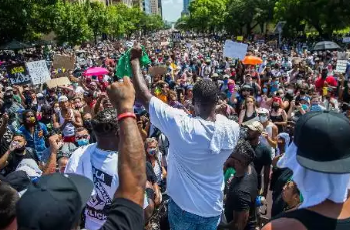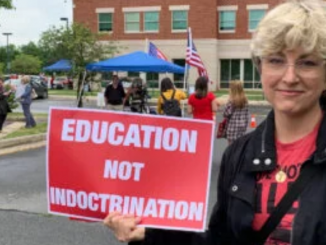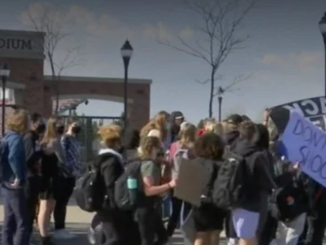
Support to redistribute police department funding has decreased among Americans since August after a summer of protests had erupted across the country against racial injustice and police brutality, a recent Ipsos/USA TODAY poll found.
The call to redistribute police budgets stemmed from Black Lives Matter activists and protesters who called to “defund the police” after the deaths of unarmed Black Americans who died at the hands of police, such as George Floyd and Breonna Taylor.
While some believe defunding the police is a call to get rid of law enforcement completely, many activists behind the slogan intended to make a more nuanced argument for police budgets to be steered toward community social programs so that officers were less often required to take on roles better suited to social workers.
Only 18% of respondents supported the movement known as “defund the police” and 58% said they opposed it. Though whites (67%) and Republicans (84%) were much more likely to oppose the movement, only 28% of Blacks and 34% of Democrats were in favor of it.
“Don’t defund the police department. We need them here to keep law and order,” Kevin Hayworth, a 66-year-old from Garner, Iowa, who is white, said. “We need our police department just as they are.”
And the responses were even more negative when Americans were asked if they thought the police should be abolished or eliminated, with 67% overall saying they were opposed, including a majority of Blacks and Democrats.
But respondents were less opposed to the idea of redirecting police funds to social services, though a 57% majority was still against the idea. Forty-three percent of Americans supported the idea. Those numbers represented a slight decline from August, after the peak of the protests, when 53% were opposed and 47% were in favor of redirecting police funds.
Valda Pugh, a retiree from Louisville, Kentucky, believes that when the call to defund the police began people didn’t fully understand the concept. “When it first surfaced, I think people had the wrong definition of what that meant. We still obviously need a police force. We need them in full force,” the 67-year-old said.
Steve Laskowitz, 73, from Boca Raton, Florida, agreed.
“I think it’s misguided,” said Laskowitz, who was among those surveyed. “I don’t think anybody wants to defund the police. I think we might want to restructure how the police budget is spent, better training, better analysis of the people who become police and more efforts towards community involvement.”
Support for the effort to redirect police funds was clearly divided along political and racial lines.
Eighty-four percent of Republicans polled support fully funding police budgets while only33% of Democrats would like to keep police budgets at their current levels. The survey found that 67% of Democrats support redistributing portions of police budgets to social programs compared to only 16% of Republicans.
“I don’t like that concept and I thought the minute it came out ‘defund’ was a horrible word. Reallocate would be the correct word,” said Mary DeLucco, a Democrat from Portland, Oregon. “Police are already defunded … We’re already understaffed in Oregon for police issues. We had five shootings yesterday and cops are having a hard time to get to those locations. They’re just not enough of them.”
Support for the redistribution of funds was also divided by the race of voters. Sixty-three percent of Black voters support distributing portions of police funds to social programs while only 35% of white voters do. Most white voters surveyed supported fully funding the police, with 65% saying police budgets should remain the same compared to 37% of Black voters.
Pugh, who is Black, also told USA TODAY that funds shouldn’t be taken away from police but “can just reallocate some of that to do more training.”
Philip Hamel from Agawam, Massachusetts, who is white, called defunding the police a “recipe for full-scale trouble.”
“And if they try that we may have a prospect that people may stand up and say ‘No way, ma’am. We’re taking up arms and forming a militia.’ If it does, I hate to prophesize it, we may have civil (war) number two but this time crazy socialist versus true-blooded Americans,” the 47-year-old said.
The poll was conducted from March 1-2 from an online sample of 1,165 Americans. Rather than a margin of error, Ipsos measured its “credibility interval,” which it put at plus or minus 3.3 percentage points.
*story by USA Today


